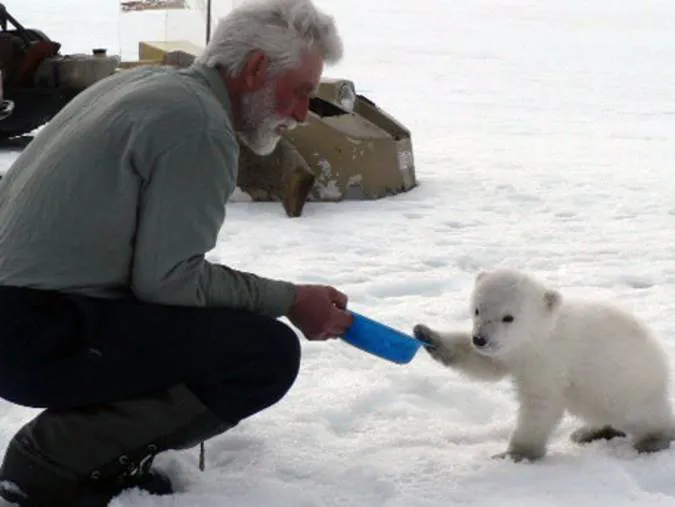
Russian Army saves polar bear cub
Nov 10, 2014

In a heartwarming incident, members of the Russian Army came to the rescue of a stranded polar bear cub found wandering alone on an ice floe in the Arctic. The cub had been separated from its mother and was in distress, prompting soldiers on a routine patrol to intervene. They carefully approached the frightened animal, providing it with food and warmth before guiding it back to safer land. The soldiers' compassion and quick action not only saved the cub's life but also highlighted the importance of protecting vulnerable wildlife in the harsh Arctic environment. The event garnered widespread attention and appreciation.
The Heartwarming Rescue
In a remarkable display of compassion, the Russian Army recently undertook a mission to save a stranded polar bear cub on the shores of the Arctic Ocean. The incident has not only captured the hearts of animal lovers around the world but has also raised awareness about the plight of polar bears in the face of climate change. This act of kindness exemplifies the unique role that military personnel can play in wildlife conservation efforts.
The Situation on the Arctic Coast
The polar bear cub was found wandering alone on an ice floe, separated from its mother. As ice conditions continue to deteriorate due to global warming, incidents like this are becoming increasingly common, highlighting the urgent need for conservation efforts. The Russian Army responded swiftly to the situation, demonstrating a commitment to both national security and environmental stewardship.
Operation Polar Bear Rescue
The rescue operation was meticulously planned and executed by trained military personnel. Equipped with specialized gear and knowledge of the region, the soldiers navigated the challenging Arctic terrain to reach the cub. Upon locating the bear, they provided immediate assistance, ensuring its safety and well-being.
Key Steps in the Rescue Operation
The following steps highlight the crucial actions taken during the rescue:
| Step | Action |
|---|---|
| 1 | Assessment of the situation |
| 2 | Deployment of rescue team |
| 3 | Safe capture of the cub |
| 4 | Transport to a wildlife rehabilitation center |
| 5 | Monitoring and care |
Impact on Wildlife Conservation
This successful rescue operation has sparked discussions about the importance of military involvement in wildlife conservation. The Russian Army's actions serve as a reminder that protecting our planet and its inhabitants can sometimes fall to unexpected heroes. It also emphasizes the role of armed forces in humanitarian efforts, particularly in remote and vulnerable ecosystems.
Public Reaction and Global Awareness
The story of the polar bear cub quickly went viral, drawing attention from news outlets and social media platforms worldwide. People from all walks of life expressed their admiration for the soldiers and shared the story to raise awareness about climate change and its effects on wildlife. This incident has become a rallying point for environmental activists advocating for stronger measures to protect endangered species.
The Role of Climate Change
As the ice melts due to rising temperatures, polar bears are facing severe challenges in finding food and shelter. This particular incident underscores the broader issues surrounding climate change and its impact on wildlife habitats. Polar bears, being apex predators in the Arctic ecosystem, are often seen as indicators of the overall health of their environment. Their struggles mirror the urgent need for global action to combat climate change.
Future Conservation Efforts
In light of this event, there are calls for increased collaboration between military organizations and environmental agencies. This partnership could lead to more efficient wildlife rescue operations and enhanced conservation strategies. The Russian Army's proactive approach may serve as a model for other nations to consider military involvement in ecological preservation.
Conclusion
The rescue of the polar bear cub by the Russian Army is a heartwarming story that highlights the intersection of compassion and environmental responsibility. It serves as a reminder that everyone has a role in protecting our planet, whether through active participation in conservation efforts or simply raising awareness. As we move forward, it is crucial to continue supporting initiatives that aim to protect vulnerable species like the polar bear and their habitats.
Call to Action
As we reflect on this inspiring rescue, let us take action in our own lives to contribute to wildlife conservation. Whether it’s supporting organizations dedicated to preserving natural habitats or reducing our carbon footprint, every effort counts. Together, we can make a difference in the fight against climate change and ensure a better future for polar bears and countless other species facing similar challenges.
Related Articles

Explore Thailand: The Best Islands to Visit for Paradise, Adventure, and Relaxation

The Ultimate Guide to the Best Islands in Thailand for Your Next Getaway

Do babies need passports? How to get a passport for a newborn

How to get a U.S. passport fast: here’s how to expedite the process

What is Mobile Passport Control: 5 reasons why you should use it

SENTRI vs. Global Entry: A detailed guide

Do you need a passport to go to the Bahamas? Let’s find out

Do you need a passport to go to Mexico? A detailed guide

Do you need a passport to go to Canada? We got the answer

Do You Need a Passport for a Cruise: An Essential Travel Guide

Booster Seat Requirements: All the Rules to Follow in Your Rental Car

What Are the World’s Most Powerful Passports, and How Does Yours Rank?

How to Take a Passport Photo at Home: A Helpful Guide

You've got to have heart! Southwest's new livery

Your opinion: Should water be free on low cost carriers?

Young women bolder than guys as solo travellers
